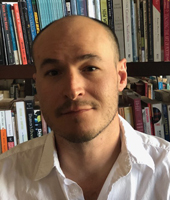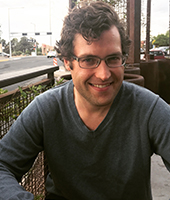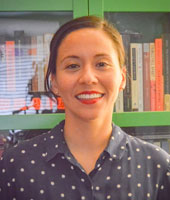2018 Bilinski Foundation Fellowship Recipients
Vincent M. Basso

Vincent M. Basso is a doctoral candidate in the department of English. His scholarship focuses on long nineteenth-century American literary studies. Vincent also works in the areas of comics studies, poetry and poetics, environmental humanities, and critical ethnography. Vincent’s dissertation analyzes the interrelationship between social crises and environmental disasters in the turn-of-the-century United States. Negotiating the domains of poverty, addiction, violence, and environment, Vincent shows how the disaster concept was flattened in print culture such that it could be repurposed to contextualize a myriad of social and environmental problems. Vincent theorizes that by reading literary naturalism through its aesthetics of disintegration we can more fully grasp how cumulative trauma conditions the interrelationship between self, society, and environment.
Elena Friot

Elena Friot is a doctoral candidate in the Department of History. Her dissertation traces New Mexico’s construction of a narrative of World War II that positions surrender, sacrifice, and defeat at the center of its wartime history and postwar commemoration. She examines the centrality of the surrender of the Philippines, the Bataan Death March, and imprisonment in Japanese prisoner of war camps to the state’s collective memory of the war, and explains how New Mexicans commemorated tragedy in a nation preoccupied by victory. She argues New Mexico’s involvement in and response to World War II reveal how Americans’ divergent experiences shaped the ways they remembered war. By highlighting the impact of the war at the microcosmic levels of family and community, her work provides insight into the state-based identity politics of commemoration and their implications for the ways we give meaning to war and conflict.
Kelly J. Hunnings

Kelly J. Hunnings is a PhD Candidate in the Department of English Language and Literature at the University of New Mexico. Her dissertation maps the existence, role, and function of a literary network between five women writers of the laboring-class poetic tradition, across three nations: Ireland, Scotland, and England, and over the course of the eighteenth century. Applying Affect, Feminist, and Marxist theories, Kelly traces the shared image of the “Chaotic Domestic,” a term she introduces to describe the consolidation of natural and domestic landscapes, in order to link historically disconnected and largely immobile writers. In doing so, Kelly re-evaluates our definitions of “literary networks” and “domesticity” broadly.
David Liakos

David Liakos is a PhD candidate in the Department of Philosophy at the University of New Mexico. He holds an MA in Philosophy from UNM and a BA in Philosophy from Connecticut College. His research focuses on the twentieth-century German philosophers Martin Heidegger and Hans-Georg Gadamer and their attempts to understand and critique the modern age. David’s dissertation illuminates how Gadamer transforms his teacher Heidegger’s systematic critique of modernity into a rehabilitation of the fundamental concepts and themes of the modern age by discovering and cultivating their hidden resources. In clarifying the relationship between Heidegger and Gadamer, and in sympathetically reconstructing Gadamer’s project of rehabilitation, David’s research aims to introduce a new theoretical orientation in the longstanding philosophical debate about modernity and how to respond to it.
María E. López

María Eugenia López is a PhD candidate in the Department of American Studies. She holds an MA in History and a BA in Anthropology from UTEP. Her dissertation explores the cultural politics of Filipina and Mexican migrant domestic workers in the United States. Maria’s dissertation examines the racial commodification of Filipina and Mexican affective labor on news media and popular culture, juxtaposed to the expressions, imaginaries and cultural productions emerging from domestic workers’ spaces of individual and collective agency. She has taught for over two years in the Chicana and Chicano Studies Department at UNM.
Karol Ibarra Zetter

Karol Ibarra Zetter is a PhD. Candidate in Hispanic Linguistics at the UNM Department of Spanish and Portuguese. Her dissertation investigates "reduction," that is, the shortening or elimination of speech sounds - a phenomenon that occurs more naturally in spontaneous speech. In English, this transformation can be observed in the following example: “I am going to” can become “I’m gonna”. Likewise, in Spanish “entonces” (then) can be reduced to “tons”.
One of the reasons accounting for reduction is that speakers use some words or phrases so frequently that they become very efficient on their pronunciation and decrease effort and/or duration of articulatory gestures. Reduction has been documented since the evolution from Latin to Romance Languages. Recently the phenomena have been investigated using data from experimental studies or sociolinguistic interviews. Karol’s dissertation studies reduction from a corpus of conversations collected in Guadalajara, México. Her research contributes to the usage-based description of phonological patterns of Spanish.



